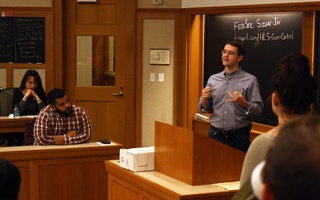{shortcode-ce757641e962b0a21f7acc71cff8a56cf2b9b6cd}
Laws instituting a waiting period between the purchase and delivery of a gun reduce gun-related homicides by 17 percent and save hundreds of lives every year, according to a recent Harvard Business School study.
The study, conducted by Business School professors Michael Luca and Deepak Malhotra and doctoral student Christopher W. Poliquin, was published in Proceedings of the National Academy of Sciences in October. Poliquin said the study was motivated by a desire to apply empirical methods from economics and business to the gun homicide issue following the 2012 shooting in Newtown, Conn.
“We kind of thought, ‘Is there something that we can do? Is there something social scientists can say about this phenomenon of gun violence in the United States,’” he said.
The team sought to evaluate which gun control policies had the greatest impact, Poliquin said. The study examined states that did and did not require people to wait several days before purchasing a handguns over a 45 year period—from 1970 to 2014—and compared changes in homicides in states with and without waiting periods.
“So we look within states over time and how deaths are changing in response to waiting periods. And what we find is a pretty substantial drop of 17 percent in gun homicides following enactment of waiting periods,” he said.
The study was funded internally by the Business School, which Poliquin said allowed the researchers to circumvent some of the issues that usually deter research on gun policy.
“Unfortunately, one of the reasons that we don't actually have a lot of research on gun policy is that it’s pretty hard for people in public health schools for example to even get this work funded. And that's because there are certain limitations from the federal government on funding gun policy research,” he said. “One of the nice things about being at a business school is that HBS can actually fund this work. It has sufficient funds to fund research internally.”
The research also examined a smaller window during the 1990s, when the federal government imposed a waiting period on some states.
“It's really the waiting period that is causing the reduction in gun homicides,” Poliquin said.
Poliquin said the paper suggests that waiting period may be effective because it allows for “visceral emotions” such as anger to diffuse.
“Even if it’s a waiting period of just a few days, it gives time for those emotions to pass. And that makes it less likely that they're going to take action in the heat of the moment that they would later regret,” he said.
—Staff writer Luke W. Xu can be reached at luke.xu@thecrimson.com. Follow him on Twitter @duke_of_luke_.Read more in News
Faust's Successor Could Begin Duties Months Before Official TransitionRecommended Articles
-
Giffords To Front Law School Class DayFormer Congress member Gabrielle Giffords and her husband Mark Kelly will be Harvard Law School's 2015 Class Day speakers.
-
Guns, Migrations, and JailsEffective gun control will require new strategies around the country. But more fundamentally, America needs integrated economic, legal, and social solutions to the deep-seated racial disparities that are at the root of urban violence around the country.
-
A False and Dangerous MovementEvery day that we forget the NRA’s mission in order to learn from its political savvy, more innocent Americans are killed by guns, and we are even farther from the possibility of justice.
-
A Disheartening DebateThe fact that we even have to confront such a question is indicative of the magnitude of the gun problem in this country.
-
 Law Groups Debate Gun Control
Law Groups Debate Gun Control













